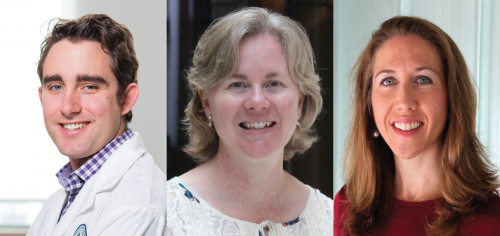Professors Dawn Kilkenny and Penney Gilbert are the recipient of the NSERC PromoScience award valued at >$22,000. A large portion of this fund will support the continued success of IBBME’s Discovery Program, a collaborative initiative between graduate students, faculty, and staff that started in 2016. The program introduces the concepts of Science, Technology, Engineering, and Math (STEM) to high school students by offering hands-on learning experiences hosted at IBBME facilities.
Several pilot studies have been successfully conducted with one Toronto high school to-date. The students attend 4 on-campus sessions to gain scientific laboratory skills over the course of 4-months, which culminates in a final presentation viewed by both UofT faculty and the public. This program has engaged over 150 high-school students with near 100% attendance.
Student participant feedback has been overwhelmingly positive. Over 75% of the students surveyed indicated that they are “more likely to pursue STEM in the future” when they transition to post-secondary education.
“The cool part of the Discovery Program is that we focus on Project Based Learning. Here, the students are given a scientific problem and they are encouraged to find innovative solutions”, says Locke Davenport Huyer, who developed and leads this initiative under the faculty support of Dr. Dawn Kilkenny. Mr. Davenport Huyer is a Vanier-funded PhD candidate in the lab of Dr. Milica Radisic.
“The long-term vision of the program is to expand the same kind of inquiry-based learning into other disciplines.” says Mr. Davenport Huyer, “Learning hard knowledge is one thing, but we also need to teach kids how to think on their own.”
A small part of the funding package also goes to support iBEAM (IBBME Biomedical Engineering and Me), an education initiative that aims to spark interest in STEM fields in grade 7 and 8 students. Both iBEAM and Discovery Programs focus on resource-limited schools that would not otherwise provide enough learning experiences for students.
“I think it’s important to give everyone a chance to thrive”, says Mr. Davenport, “Expensive research equipment is not often accessible to high-school students. This learning experience will give them a chance to experience new things.”
“Allowing youth the opportunity to explore and discover in an experiential environment often ignites sparks of interest to study areas previously ignored, thereby leading to a stronger next generation of scientists and Biomedical Engineers.” says Professor Kilkenny. She is the Discovery Program faculty advisor and is currently IBBME’s associate director of Undergraduate Programs.


